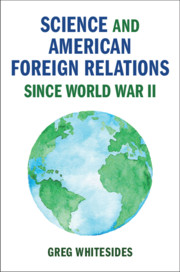Book contents
- Science and American Foreign Relations since World War II
- Cambridge Studies in US Foreign Relations
- Science and American Foreign Relations since World War II
- Copyright page
- Dedication
- Contents
- Figures
- Acknowledgments
- Abbreviations
- Introduction
- 1 The Battle of the Laboratories
- 2 Science Contained
- 3 The Quiet War
- 4 The Crossing Point
- 5 Reorientation
- 6 Globalization
- 7 The Fray
- 8 The Laboratory of Diplomacy
- Appendix
- Bibliography
- Index
7 - The Fray
Published online by Cambridge University Press: 14 December 2018
- Science and American Foreign Relations since World War II
- Cambridge Studies in US Foreign Relations
- Science and American Foreign Relations since World War II
- Copyright page
- Dedication
- Contents
- Figures
- Acknowledgments
- Abbreviations
- Introduction
- 1 The Battle of the Laboratories
- 2 Science Contained
- 3 The Quiet War
- 4 The Crossing Point
- 5 Reorientation
- 6 Globalization
- 7 The Fray
- 8 The Laboratory of Diplomacy
- Appendix
- Bibliography
- Index
Summary
- Type
- Chapter
- Information
- Science and American Foreign Relations since World War II , pp. 252 - 298Publisher: Cambridge University PressPrint publication year: 2019

